“The world of tomorrow” in the Aachen city region.
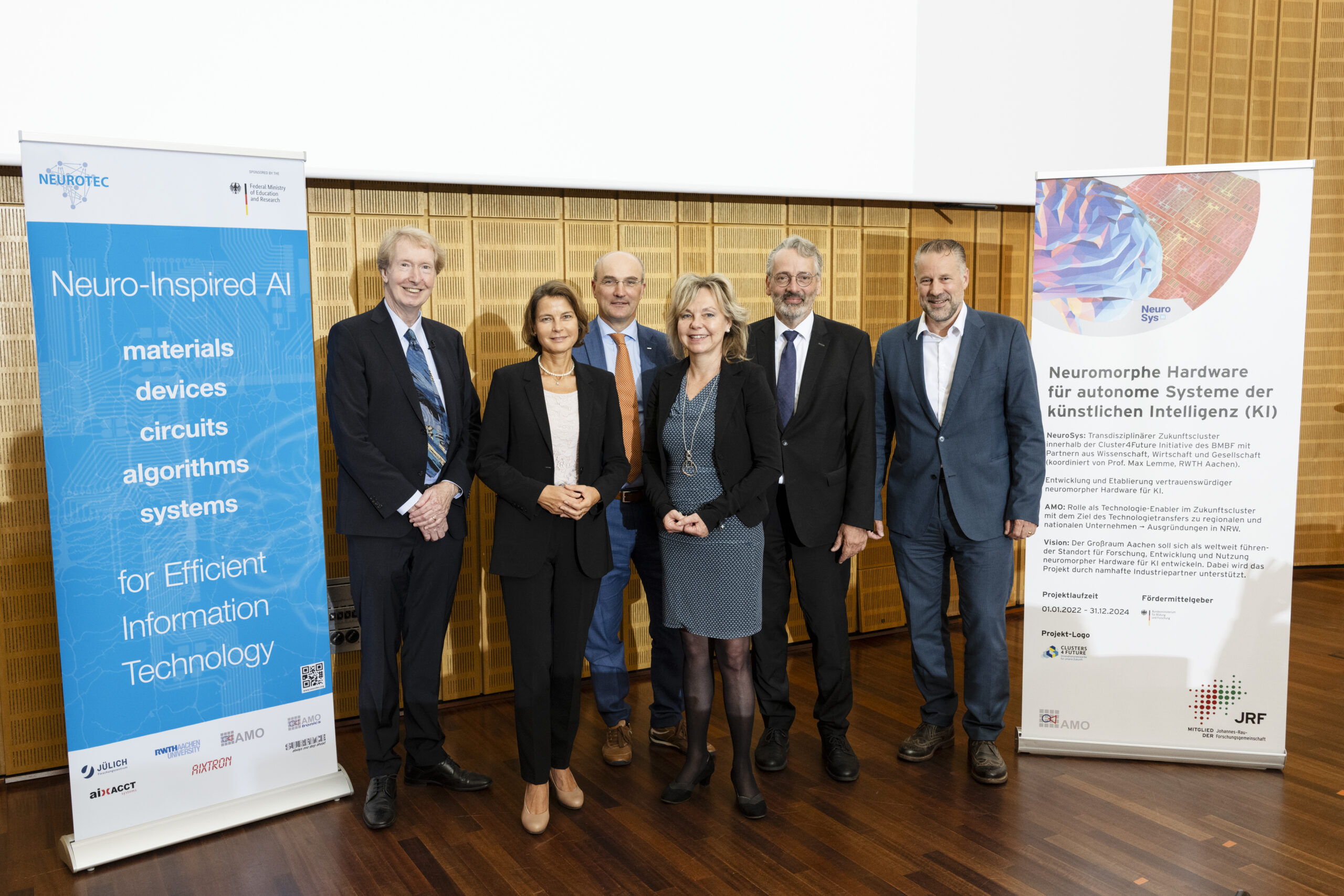
From left to right: NEUROTEC Coordinator Prof. Rainer Waser, FZJ Board Chair Prof. Astrid Lambrecht, RWTH Rector Prof. Ulrich Rüdiger, BMBF State Secretary Prof. Sabine Döring, MKW-NRW State Minister Thorsten Menne, NeuroSys Coordinator Prof. Max Lemme © Kurt Steinhausen Forschungszentrum Jülich
Neuroinspired computer chips could make the decisive contribution to meeting the growing energy requirements of artificial intelligence (AI). Researchers presented the current status and future prospects of this groundbreaking technology in the course of the Jülich-Aachen Neuromorphic Computing Day on August 30, 2023.
By mimicking the way the human brain works, neuromorphic chips offer an enormous increase in energy efficiency and thus only open up groundbreaking possibilities for applications such as autonomous driving and Industry 4.0 through real-time data processing. Designed in close collaboration between RWTH Aachen University, Forschungszentrum Jülich and partners from high-tech companies and start-ups, researchers offered insights into their work. In addition to around 200 guests from science, industry and politics, BMBF State Secretary Sabine Döring also accompanied the event.
Close cooperation between research institutions and companies in the region is at the heart of this initiative. The model enables the direct transfer of research results to industry and strengthens regional innovative power. Not only do regional structural change and job creation play a role here, but also the vision of independent chip production in Germany.
“With our research, we span the entire value chain, including sociological and ethical issues that disruptive technologies always raise. This offers opportunities at many technological levels for regional companies and startups to accelerate structural change. We are already seeing initial effects on the labor market and business investment. In the long term, semiconductor manufacturing in the region would ideally complement the existing, comprehensive and internationally recognized expertise and infrastructure and once again significantly increase the attractiveness of the region for the excellently trained brains from the research center and RWTH,” sums up NeuroSys coordinator Prof. Max Lemme from RWTH Aachen University and Managing Director of AMO GmbH.
The impressive future prospects of this technology and the cooperation between research and industry in the region thus create a dynamic that not only drives groundbreaking technologies, but also inspires young talents to get involved at RWTH Aachen University and contribute to this exciting field of research.
Further information on the Jülich-Aachen Neuromorphic Computing Day, as well as on the NEUROTEC project and the NeuroSys future cluster, can be found on the Forschungszentrum Jülich website.
German Study Award: Silver goes to Dominik Šišejković
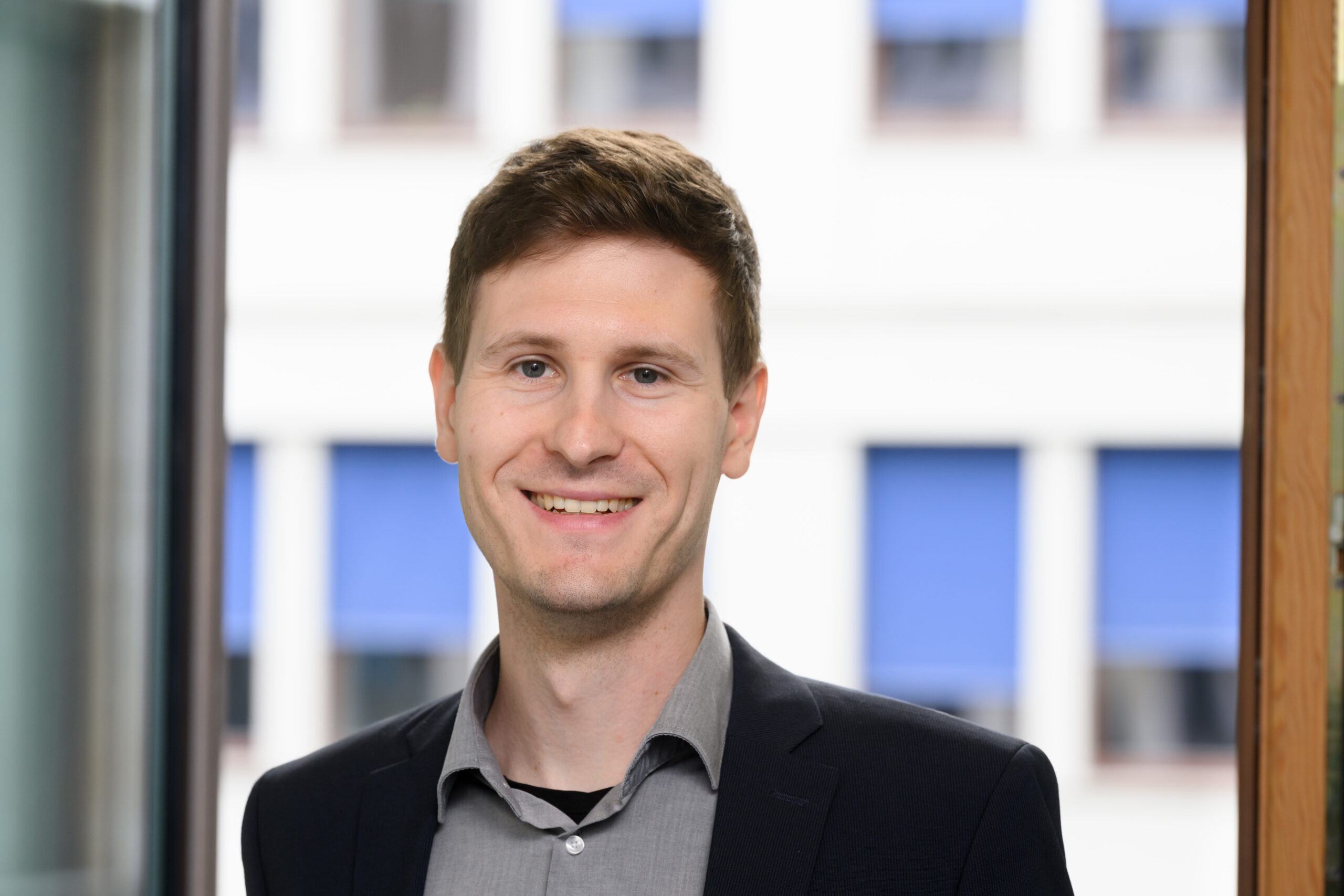
Award winner Dominik Sisejkovic ©David Ausserhofer
His excellent dissertation, Development of trustworthy microelectronics – from theory to practice, will be honored by the Körber Foundation with the German Study Award 2023 on November 27 at the German Parliamentary Society in Berlin. Dominik Šišejković will receive the second prize in the Natural and Technical Sciences section from Bundestag President Bärbel Bas.
The focus of his doctoral thesis is the question of how hardware can be protected against decentralized modifications. This is all because hardware Trojans represent one of the greatest security threats of the modern age. Such a carefully designed modification allows attackers to gain access to critical infrastructure, extract secret information or even shut down systems at the worst possible moment.
“In this work, we take a step-by-step approach to understanding logic encryption, from its basic mechanics to software implementation to an in-depth analysis of its security properties in the age of machine learning,” explains Dominik Šišejković, a PhD student at RWTH Aachen University in the Department of Electrical Engineering.
One possible solution is hidden in logic encryption, a leading technique for securing hardware. The results were bundled into an industry-proven encryption method that provides a secure way to protect hardware.
The German Study Award is one of the most highly endowed prizes for young scientists in Germany. Each year, it honors outstanding young scientists from all disciplines. The Körber Foundation awards prizes totaling more than 100,000 euros for excellent dissertations of particular social significance.
First RWTH GreenTech Late Night at Theater Aachen
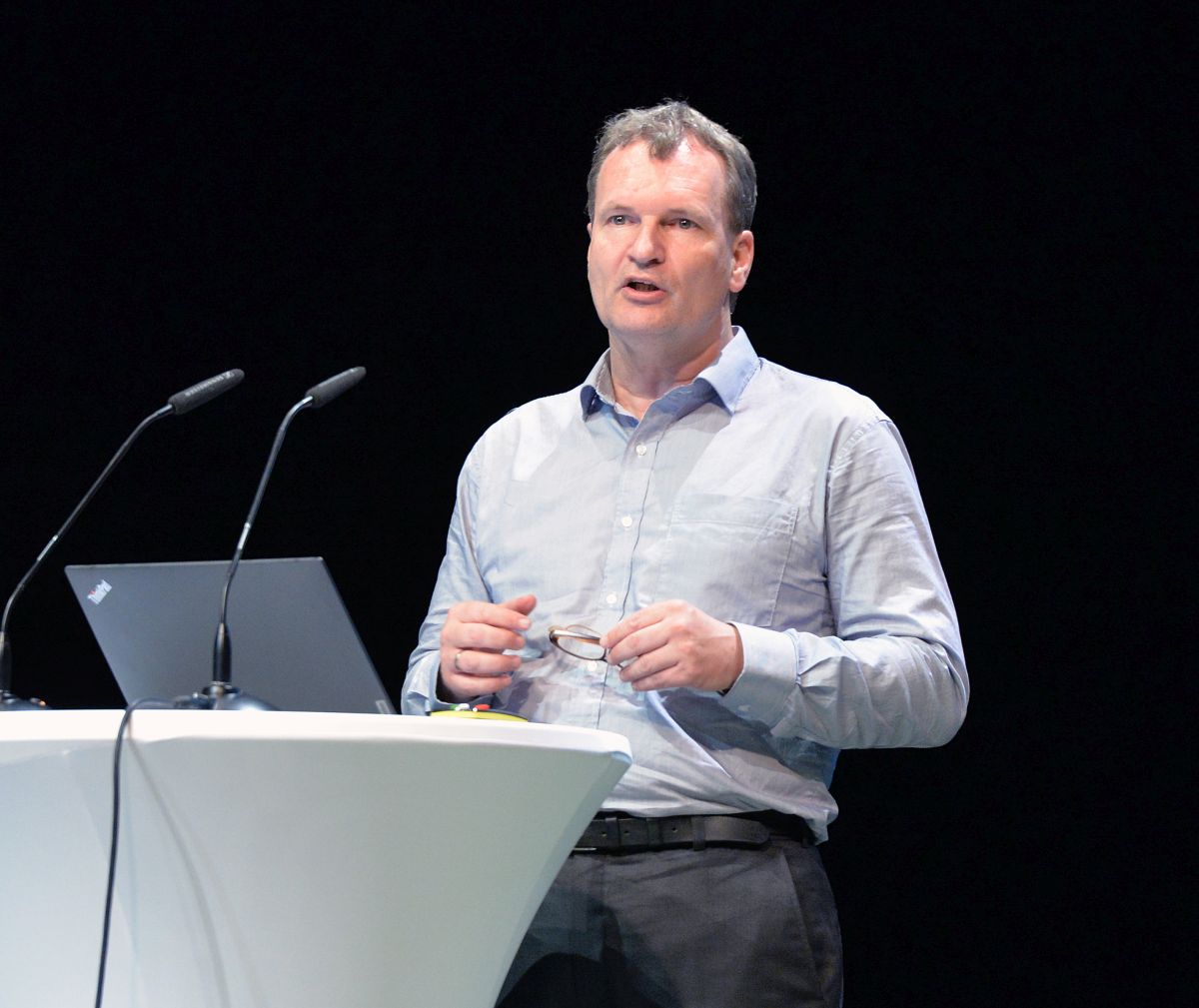
RWTH professor Dirk Uwe Sauer argues the view of science ©Andreas Schmitter
At the birth of a platform of engagement and exchange, the RWTH GreenTech Late Night, the academic world was in the spotlight at Theater Aachen on June 19, 2023. Represented by RWTH professors Kai-Uwe Schröder and Prof. Dirk Uwe Sauer, the science perspective took a starring role, conveying how essential it is to actively communicate scientific findings about climate change and the underlying technologies to the broader society in order to raise awareness and promote collective action to combat climate change. In this regard, dialogue between research, technology and policy is essential at a time of fundamental change and transformation.
“I think the initiative for the event is very good. We need much more communication out of science into society in these times of fundamental upheaval,” sums up Professor Dirk Uwe Sauer, battery expert at RWTH Aachen University.
The first RWTH GreenTech Late Night at Theater Aachen was an unprecedented event that bridged the boundaries between science, technology and society. In the process, the theater became a vibrant arena of knowledge exchange, bringing together experts, visionaries and creatives to discuss the most pressing challenges in the field of climate protection.
This extraordinary event offered a multi-faceted program ranging from keynote speeches and interviews to artistic readings and cabaret interludes. The variety of formats painted a comprehensive picture of the complex topic while emphasizing the vibrancy and dynamism of academia.
The RWTH GreenTech Late Night impressively demonstrated how innovation and knowledge transfer can be driven forward in times of climate change. The event encouraged finding new ways of collaboration between science, technology, politics and culture to jointly shape a sustainable path into the future. This platform will undoubtedly continue to play an important role in shaping the global climate agenda.
Detailed information about the event’s schedule and guests is available at GreenTech Late Night – To Solve the Climate Crisis, You Need Both an Ear for Science and a Commitment to it.
Voices from the GreenTech Late Night reflect the opinions of the guests, who deal with the climate crisis and possible ways out in their own way.
The Reichart Prize 2023 goes to Dr.-Ing. Weihan Li
Prof. Frank Hellwig and Prof. Peter Scharff award Dr. Weihan Li the Reichart Prize 2023 © Mathias Brösicke
A remarkable contribution to application-oriented science was honored when Dr.-Ing. Weihan Li received the coveted Reichart Prize on June 24, 2023. The junior research group leader at the Center for Ageing, Reliability and Lifetime Prediction for Electrochemical and Power Electronics Systems (CARL) at RWTH Aachen University was recognized for his pioneering work in digitizing battery use with a digital twin. This innovative approach aims to provide greater clarity on battery aging processes, safety and reliability.
Named after Christian Reichart, a versatile Erfurt resident, the prize awarded annually highlights outstanding graduate work in various scientific fields. The cooperation between the state capital of Erfurt, the University of Erfurt and the University of Applied Sciences in Erfurt ensures that this prize promotes talented young scientists whose work has a clear link to applicability. In doing so, it honors the legacy and vision of Christian Reichart, who already distinguished himself in the 18th century as a pioneer of interdisciplinary research and non-profit applications. The award committee, consisting of representatives from these institutions, selects the winners and acknowledges promising research approaches with prize money of 2,000 euros and strengthens interdisciplinary exchange. This award underlines the importance of using scientific findings for the benefit of society and building bridges between different disciplines to create practical solutions to current challenges.
More about the Reichert Prize can be found on the website of the Academy of Erfurt.
CO2For-IT: A data room for the timber industry with a focus on climate protection
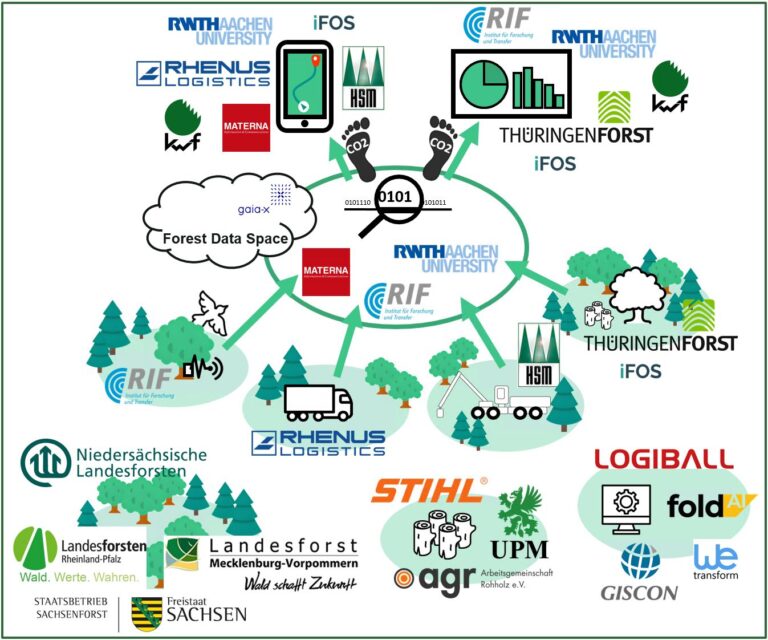
Project partners in CO2For-IT. © Institute for Man-Machine Interaction RWTH Aachen University
A new initiative to promote a climate-friendly timber industry was launched in July 2023. The CO2For-IT project, supported by the Federal Ministry of Economics and Climate Protection, aims to create a “Forest Data Space” to enable the sustainable use of wood from forests.
The Forest Data Space will provide data on the carbon footprint of the entire timber value chain and therefore support the development of data-based solutions for climate protection. The project is led by Materna Information & Communications SE and coordinated by the Dortmund Institute for Research and Transfer (RIF e.V.). Other partners include RWTH Aachen University, Rhenus Forest Logistics GmbH & Co. KG, HSM Hohenloher Spezial Maschinenbau GmbH & Co. KG, Forstliches Forschungs- und Kompetenzzentrum Gotha (ThüringenForst – AöR) and Kuratorium für Waldarbeit und Forsttechnik e. V. (KWF). In addition, foldAI and iFOS GmbH are collaborating with the project.
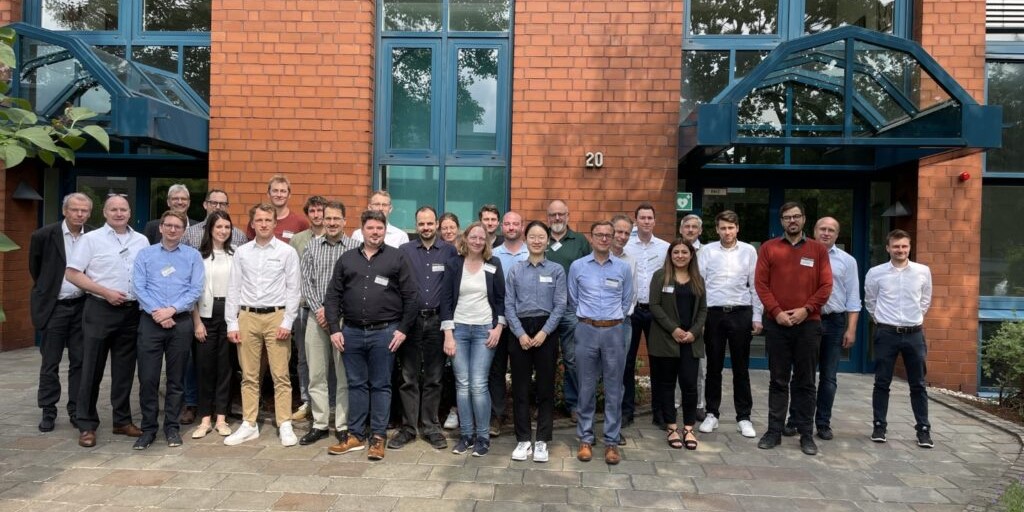
© Institute for Man-Machine Interaction RWTH Aachen University
For more information visit: KWH 4.0 | CO2For-IT (kwh40.de) (only in german)
MedIT looks back on 20 years of history

Happy Birthday!
Since the founding of the Chair of Medical Information Technology (formerly the Philips Chair of Medical Information Technology) on 01.08.2003, a lot has happened: new research areas have been opened up, international collaborations have been established, a branch office has been opened and many young PhD students have graduated here.
MedIT is grateful and proud of this development and would like to share it with old and new colleagues, partners and friends.
To mark this occasion, an anniversary celebration will take place in September 2023, which will also include a symposium in which MedIT would like to discuss the past and future of the chair as well as medical technology in Aachen and the world.
Further information on the lecture programme: Das MedIT feiert sein 20-jähriges Bestehen (rwth-aachen.de) (only in german)
New Perspectives for Communication Technology: A German-Japanese Partnership
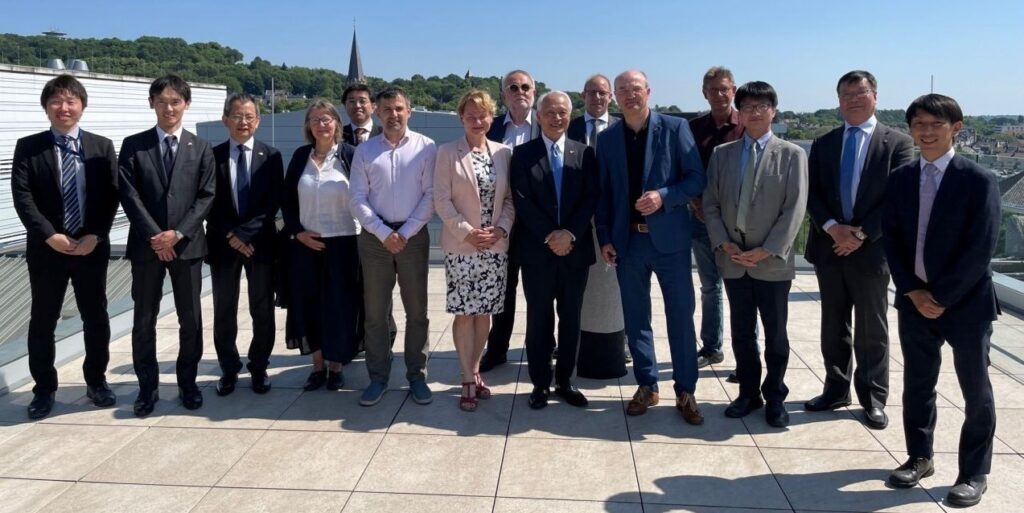
A delegation from the National Institute of Information and Communication Technology (NICT) in Japan visited RWTH Aachen University for the signing of a Memorandum of Understanding. © RWTH Aachen University
RWTH University has started an exciting cooperation in the field of 5G/6G mobile communications technology with the National Institute of Information and Communication Technology (NICT) in Japan. This was sealed by a memorandum of understanding that Professor Ulrich Rüdiger and Professor Hideyuki Tokuda, President of NICT, signed together in June. They received a delegation from NICT at RWTH Aachen University.
The Memorandum of Understanding is intended to strengthen and expand academic cooperation between both partner institutions. This includes the exchange of scientists and students, collaborative research projects, publications and the transfer of knowledge on 5G/6G mobile communications technology.
The cooperation was initiated as part of the BMBF-funded research programme “6GEM Research Hub”, which is coordinated by Professor Haris Gačanin from the Chair of Distributed Signal Processing at RWTH. In this project, RWTH Aachen University, Ruhr University Bochum, Dortmund University of Technology and the University of Duisburg-Essen, as well as the Fraunhofer Institute for Material Flow and Logistics, the Fraunhofer Institute for Microelectronic Circuits and Systems, the Fraunhofer Institute for High Frequency Physics and Radar Techniques and the Max Planck Institute for Security and Privacy are researching future communication technologies in 6G mobile communications technology.
Source: RWTH press release: Research Partnership With NICT in Japan – RWTH AACHEN UNIVERSITY – English (rwth-aachen.de)
Energy Park Herzogenrath: Chair of Electrochemical Energy Conversion and Storage Systems is involved in research
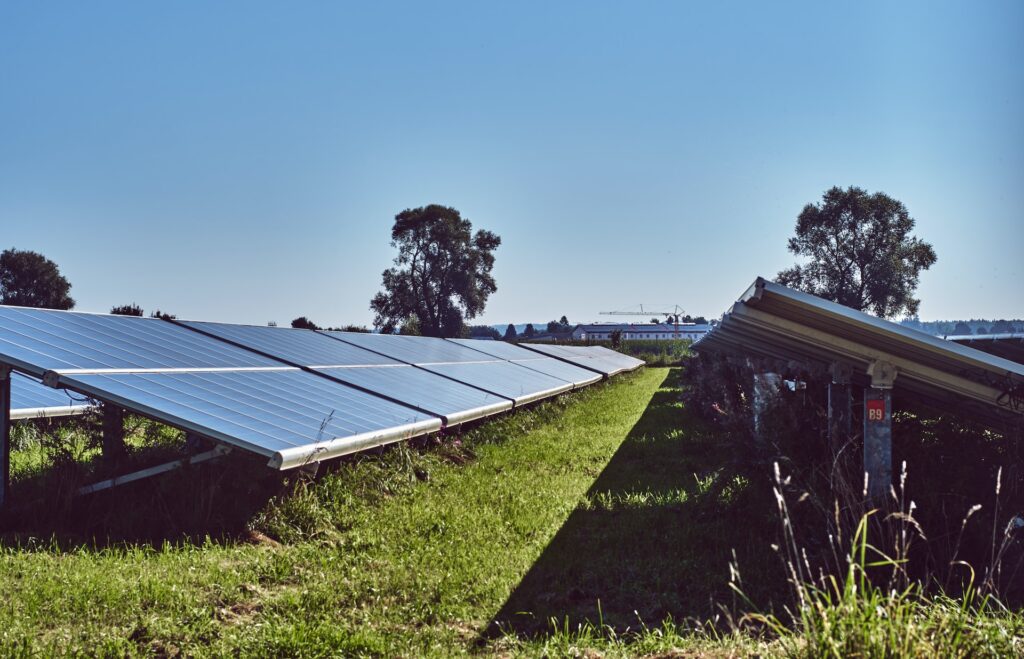
© Michael Förtsch by Unsplash
The project for CO2-neutral energy supply in Herzogenrath, the first city in NRW to strive for this goal, is accompanied by a consortium of four chairs and institutes, including the Chair of Electrochemical Energy Conversion and Storage Systems Technology.
Herzogenrath wants to achieve CO2-neutral energy supply by 2030. A consortium of Siemens Energy, RWTH Aachen University, Aachen University of Applied Sciences and the Niederrhein University of Applied Sciences is conducting research on the project “Energy Park Herzogenrath Research & Development”, which is funded by the Federal Ministry of Economics and Climate Protection with 2.7 million euros. The project is also closely interlinked with other ongoing research and funding projects: at the local flat glass manufacturer Saint Gobain, CO2-free production is being researched, in which the Chair of Electrochemical Energy Conversion and Storage Systems Technology at the E.ON Energy Research Center (ERC) of RWTH Aachen University is involved. The aim is to recycle the heat generated during glass production in Herzogenrath and Kerkrade in the Netherlands as green heating energy.
The project uses a digital twin that virtually maps and simulates the energy supply. In this way, different scenarios can be tested and optimised. The project looks at generation, consumption and marketing options across sectors. RWTH is receiving around 918,000 euros in funding for this.
More information on the project can be found at Energiepark Herzogenrath – Strukturwandel Rheinisches Revier (revier-gestalten.nrw) and at CO2-neutral bis 2030: Forschungsprojekt Energiepark Herzogenrath mit rund 2,7 Millionen Euro gefördert | Wirtschaft NRW.
Climate protection through electrical engineering – Professor Dirk Uwe Sauer’s lecture at the Children’s University
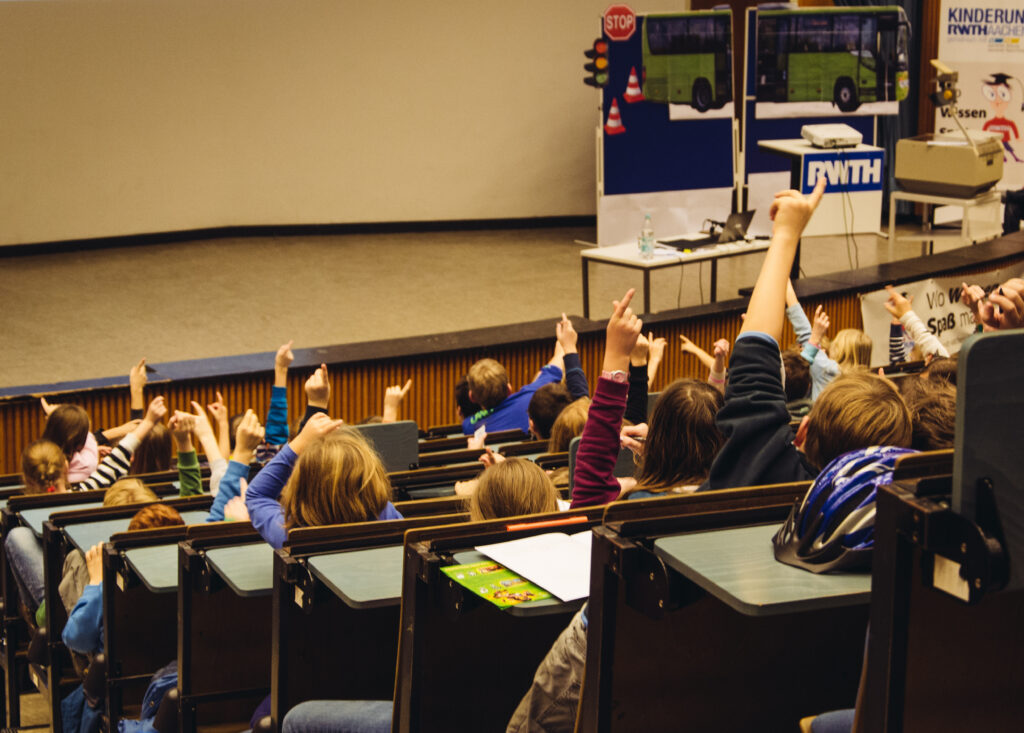
Kinder im Hörsaal. ©RWTH Aachen University
Whether drought, floods or forest fires – the consequences of global warming are dramatic for nature and people. The countries of the global south are being hit particularly hard, but the effects are also being felt here. We experienced this at the latest with the devastating floods in July 2021. That is why we urgently need to address the issue of climate change.
This is also what Dirk Uwe Sauer, Professor of Electrochemical Energy Conversion and Storage Systems Technology at RWTH Aachen University, is doing. He has been researching new energy systems for over 30 years and advises politicians on the energy transition.
„We see in all places that climate change is happening – with many negative consequences. And we urgently need a radical change in the way we have supplied ourselves with energy so far.“
This does not only affect us adults, but especially the children and young people of today. They will have to live with the limitations that climate change will bring. “I don’t think we should underestimate what children know and what they are capable of,” says Professor Sauer.
It is not too late to make a difference
In his lecture, the physicist not only explained the dangers of climate change, but also made the necessary changes understandable. He used various materials such as videos, slides and interactive presentations to show the physical basics and the possibilities through timely action: “I also want to spread optimism and show that things can also get better than they currently are. Because if we still grab the wheel in time, then we still have the possibility to avoid worse things.” For this to happen, however, society must overcome its fear of new technologies. The professor said that there is too much talk about the risks instead of seeing the opportunities. “And we simply can’t afford that now either.” A ruling by the Federal Constitutional Court in 2021 has obliged politicians, and thus the population, to act more quickly. The slower progress is made, the more the living conditions of the next generations are restricted. That is why the previous federal government tightened the climate protection targets and the Climate Protection Act. “We have the opportunity to achieve these goals. We have the necessary technologies to supply all eight billion people in the world properly with renewable energy,” Sauer said.
Climate change is an important issue that concerns us all. But what does it actually mean and how can we work against it? Professor Sauer explained this to the children in his lecture at the Children’s University on 16 June 2023. He showed them how the earth is warming up and what consequences this has for nature and people. He also presented solutions on how we can protect the climate with renewable energies and new technologies. For example, with solar cells that generate electricity from sunlight, or with electric cars that emit no exhaust gases. Professor Sauer showed the children not only the problems of climate change, but also the opportunities that arise from it. He showed them that we can not only influence the climate with our energy supply, but also promote biodiversity.
„I would like to show the children that, for example, large photovoltaic systems on open fields not only generate electricity, but also create space for extensive agriculture, for insects that can live and flourish in these areas again.“
Climate change is a major challenge that we can only overcome together. For this, we need an awareness of the connections between energy and the environment that starts with children. Another goal of the Children’s University event was to get the children excited about scientific topics. “Physics has the great advantage that it can illustrate things very vividly and also show connections,” said Sauer. Using simple means, Professor Sauer showed where research starts and what possibilities can arise through technical progress.
Source: Aachener Zeitung, 16 June 2023
Neuroscience simulators of the future: How a new approach is taking research to the next level
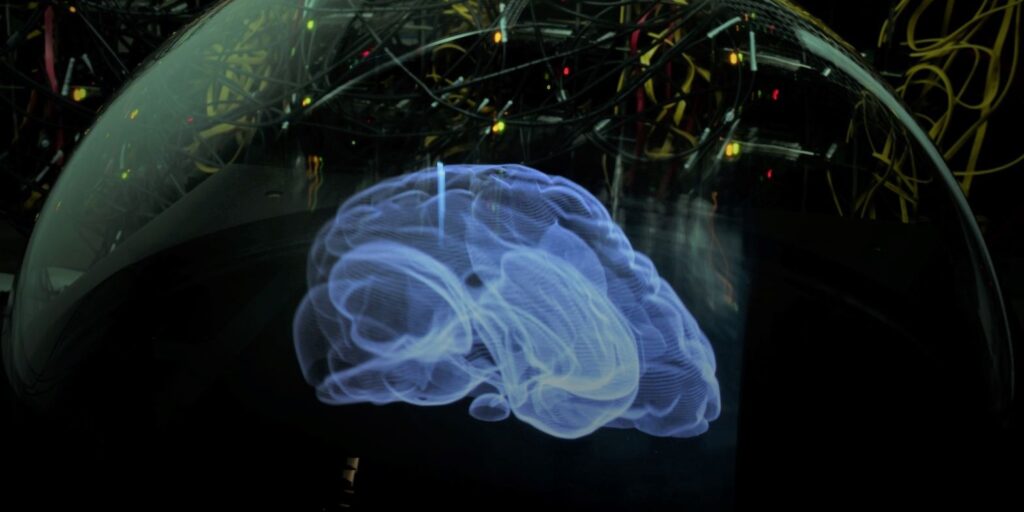
©Chair of Integrated Digital Systems and Circuit Design
A new type of framework called “neuroAIˣ” has been developed by the group of RWTH professor Tobias Gemmeke. This framework is highly flexible and makes it possible to better understand and model the brain and its information processing.
The brain is one of the most fascinating and complex organs, raising many questions. How does it work? How does our consciousness and behaviour emerge from the activity of billions of neurons? How can we learn from the brain to build more powerful and efficient computers?
To answer these questions, neuroscientists are studying the structure and function of microcircuits in the brain, which consist of groups of neurons. These microcircuits are responsible for processing information in different regions of the brain. By analysing how neurons in these circuits work together, they can develop models that explain how the brain processes information and how behaviour results. To test and improve these models, computer simulations of artificial neural networks are essential.
The “neuroAIˣ” framework provides a platform to perform such computer simulations. It is highly flexible and allows different types of neural networks to be created, trained and analysed. Both biologically plausible and artificial neural networks can be considered. The framework is also scalable and can be used on different hardware platforms, from conventional CPUs to specialised chips for brain-inspired computing.
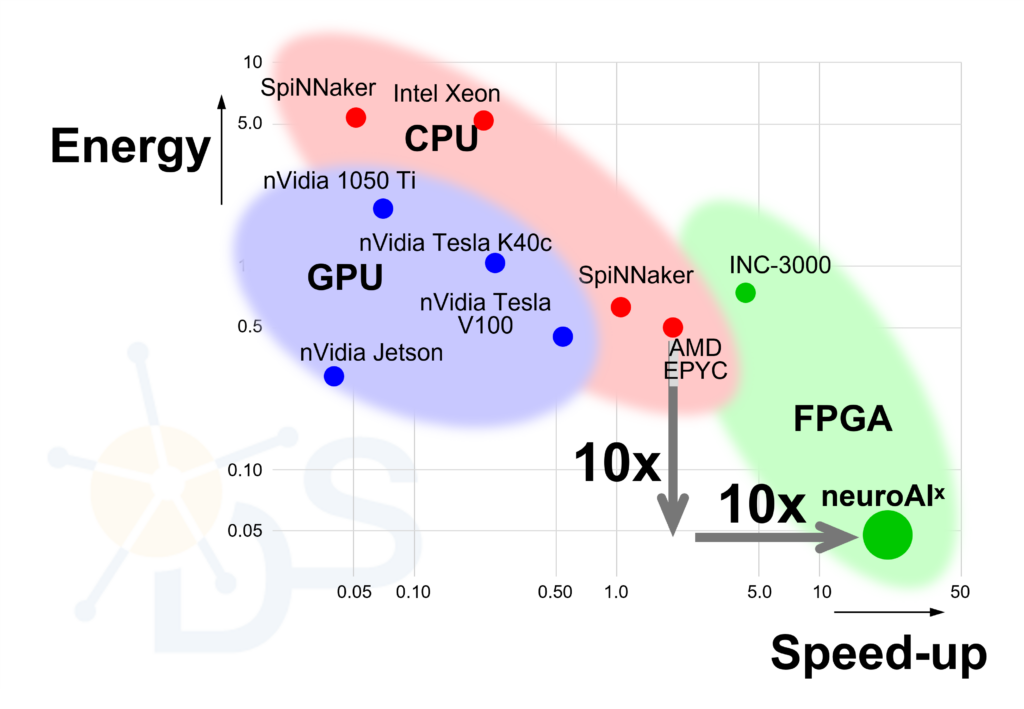
neuroAIˣ FPGA cluster is ten time faster and ten time more energy efficient than today’s best neuroscience simulators at running of biological neural networks. ©Chair of Intrinsic Digital Systems and Circuit Design
The framework consists of two components: a software tool that can rapidly evaluate neuromorphic architectures and a hardware cluster composed of 35 FPGA (Field-Programmable Gate Array) cards. The hardware cluster has two functions: It can be used as a test platform to calibrate the software tool and test the proposed architectures for efficiency. It can also act as a neuroscience simulator, beating the best existing platforms by a factor of ten in terms of speed and energy efficiency.
“We are pleasantly surprised by the high speed-up and energy efficiency achieved by our system, as the focus of our work was on the flexibility and reproducibility of the simulator system,” explains Kevin Kauth, PhD student in Tobias Gemmeke’s group and one of the main developers of the project.
A possible future vision of Gemmeke and his team is to build a high-capacity FPGA cluster and develop a web platform that will allow neuroscientists and AI experts from all over the world to use the cluster via the cloud.
You can find more information about this exciting project at neuroaix.de.
A detailed description of the neuroAIx framework has been reported in the open-access journal Frontiers in Computational Neuroscience.



